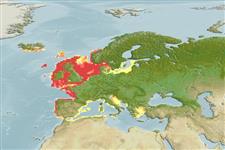>
Gadiformes (Cods) >
Gaidropsaridae (Rocklings)
Etymology: Gaidropsarus: Greek, ga, ge = the earth + Greek, ydro = water + Greek psaros = speckled, starling (Ref. 45335).
Environment: milieu / climate zone / depth range / distribution range
ນິເວດວິທະຍາ
ສັດທະເລ ອາໄສຢູ່ໃກ້ໜ້າດິນໃຕ້ພື້ນທ້ອງນ້ຳ; ບໍ່ມີການເຄື່ອນຍ້າຍ; ລະດັບຄວາມເລິກ 20 - 120 m (Ref. 35388). Temperate; 64°N - 34°N, 23°W - 27°E
Northeast Atlantic: central Norwegian coast and the Faeroe Islands southwards through the North Sea and around the British Isles to the region around the Straits of Gibraltar. Reported from Iceland (Ref. 12462). Also in the western and northern coasts of the Mediterranean.
ຂະໜາດ / ນ້ຳໜັກ / Age
Maturity: Lm ? range ? - ? cm
Max length : 60.0 cm TL ຕົວຜູ້/ບໍ່ມີເພດ; (Ref. 1371); common length : 25.0 cm TL ຕົວຜູ້/ບໍ່ມີເພດ; (Ref. 3397)
ຄີ (ໜາມ)ແຂງຢູ່ຫຼັງປາ (ທັງໝົດ) : 0; ຄີ(ໜາມ) ແຂງຢູ່ຄີກົ້ນປາ
ກຸ່ມປາກະດູກແຂງ
ຄວາມຖີ່ຂອງກຸ່ມຖ່າຍທອດພັນ
ປາທີ່ມີການເຄື່ອນຍ້າຍຈາກທະເລໄປຫານ້ຳຈືດ ແລະນ້ຳຈືດຫາທະເລ
ປາທີ່ມີການເຄື່ອນຍ້າຍຈາກທະເລແລະໄປໄຂ່ຢູ່ນ້ຳຈືດ
ຄີກົ້ນຂອງປາ
ສັດທີ່ມີກະດູກສັນຫັຼງ
ການຖ່າຍທອດທາງກຳມະພັນຈາກພໍ່ແມ່ຫາລູກ: 0. First dorsal ray followed by a row of small, fleshy filaments. Color is varies from dusky to pale. Fin coloration varies geographically in the Western Atlantic, with southern specimens having more dark blotches than northern ones (Ref. 1371). One barbel on the lower jaw and two on the snout. Large chocolate brown spots on head and body (Ref. 35388).
Found on rocky bottoms but also on mud, sand and gravel. Feed on shrimps, crabs, isopods, small fish, mollusks and polychaetes (Ref. 1371). Spawn during spring and summer in the Mediterranean. Eggs and larvae are pelagic (Ref. 1371).
Life cycle and mating behavior
Maturities | ການສືບພັນ | Spawnings | Egg(s) | Fecundities | ຕົວອ່ອນ
Cohen, D.M., T. Inada, T. Iwamoto and N. Scialabba, 1990. FAO species catalogue. Vol. 10. Gadiform fishes of the world (Order Gadiformes). An annotated and illustrated catalogue of cods, hakes, grenadiers and other gadiform fishes known to date. FAO Fish. Synop. 125(10). Rome: FAO. 442 p. (Ref. 1371)
IUCN Red List Status (Ref. 130435)
Threat to humans
Harmless
Human uses
ການປະມົງ: ທີ່ເປັນການຄ້າໜ້ອຍ
ເຄື່ອງມື
Special reports
Download XML
ແຫຼ່ງອີນເຕີເນັດ
Estimates based on models
Preferred temperature (Ref.
123201): 7.1 - 12.6, mean 9.6 °C (based on 254 cells).
Phylogenetic diversity index (Ref.
82804): PD
50 = 0.5001 [Uniqueness, from 0.5 = low to 2.0 = high].
Bayesian length-weight: a=0.00490 (0.00304 - 0.00790), b=3.01 (2.87 - 3.15), in cm total length, based on LWR estimates for this species & (Sub)family-body (Ref.
93245).
ຊັ້ນເຂດຮ້ອນ (Ref.
69278): 3.5 ±0.4 se; based on diet studies.
ຄວາມຢືດຢຸ່ນ (Ref.
120179): ຂະໜາດກາງ, ປະຊາກອນຕຳ່ສຸດທີ່ໃຊ້ເວລາສອງເທົ່າ 1.4 - 4.4 ປີ (tmax=6).
Fishing Vulnerability (Ref.
59153): Moderate vulnerability (44 of 100).
Nutrients (Ref.
124155): Calcium = 42.4 [19.9, 94.9] mg/100g; Iron = 0.375 [0.191, 0.788] mg/100g; Protein = 17.5 [15.7, 19.4] %; Omega3 = 0.356 [0.177, 0.686] g/100g; Selenium = 17.9 [9.2, 38.7] μg/100g; VitaminA = 7.64 [1.68, 31.14] μg/100g; Zinc = 0.497 [0.341, 0.757] mg/100g (wet weight);
